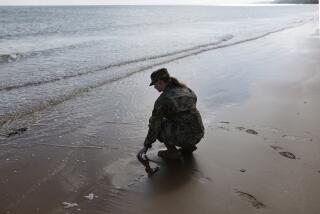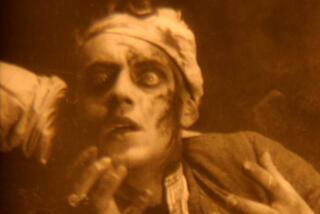Knowledge of the sort that isn’t found in guidebooks
- Share via
You can rarely predict what you will remember from a trip, what will seem most moving and meaningful. I recently returned from a weeklong visit with my sister and brother-in-law, who live in Brussels. There were frites and mussels, of course, museums, walks in the sedate Parc de Bruxelles. But what will stay with me more is an unplanned day trip we took to the In Flanders Fields Museum at Ieper, a small town in western Belgium where half a million people died during some of the most hideous trench fighting of World War I.
In Brussels, a handsome, placid city full of buttoned-up bureaucrats carrying briefcases and speaking the myriad languages of the European Union, there’s little evidence that the country was one of the Continent’s chief war zones -- from the Battle of Waterloo, where the Duke of Wellington vanquished Napoleon in 1815, to World War II, when the German blitzkrieg swept across Belgium on its way to Paris. Between the two, there was World War I. By the end of the “war to end all wars,” 9 million people had died, Europe was reconfigured so that the stage was set for Hitler, and Ieper was wiped off the map, along with its 13th century Cloth Hall and Gothic Cathedral of St. Martin.
For the record:
12:00 a.m. Aug. 17, 2003 For The Record
Los Angeles Times Tuesday August 12, 2003 Home Edition Main News Part A Page 2 National Desk 1 inches; 48 words Type of Material: Correction
‘In Flanders Fields’ poet -- The Her World column in Sunday’s Travel section incorrectly reported that John McCrae, author of the poem “In Flanders Fields,” died at Ieper, Belgium. The Canadian surgeon-poet served in the Ieper salient but died Jan. 28, 1918, at a hospital in Wimereux, France.
For The Record
Los Angeles Times Sunday August 17, 2003 Home Edition Travel Part L Page 3 Features Desk 1 inches; 53 words Type of Material: Correction
Her World -- The Her World column in the Aug. 10 Travel section (“Knowledge of the Sort That Isn’t Found in Guidebooks”) incorrectly reported that John McCrae, author of the poem “In Flanders Fields,” died at Ieper, Belgium. The Canadian surgeon-poet served in the Ieper salient but died Jan. 28, 1918, in France.
I have old photos of my grandfather, in his U.S. infantry gaiters, when he was “over there” in 1918, but until I visited Belgium last month, everything else I learned in school about World War I had long since faded from memory. It took a visit to Ieper to remind me why red poppies decorate graves in Great War cemeteries, why unassuming little Belgium is hallowed ground and why patriotic saber rattling has a false, tinny sound.
Martha, Scott and I drove west about an hour and a half from Brussels to Ieper. (Belgium is bilingual, so it’s Ieper in Flemish and Ypres if you’re a French-speaker; British soldiers who couldn’t manage either called it Wipers.) On the way, I read aloud from a book about World War I, remembering my late mother, who thought learning was the whole point of travel. We easily found the town’s main square, a step-gabled medieval set piece faithfully rebuilt after the war, and lunched at a cafe on tiny shrimp from the North Sea.
Then we went to the rebuilt Cloth Hall, site of the In Flanders Fields Museum, which in 1998 replaced an earlier, lower-tech WWI museum here. The new facility uses computer and audiovisual technologies as well as art, vintage photos and artifacts to tell the story of the role Ieper played in the Great War.
For four long, gruesome years beginning in 1914, when German troops roared across Belgium on the way to France (where they were stopped within sight of Paris) to the armistice in November 1918, the city was all but surrounded by the fetid trenches and desolate no man’s land of the Ieper salient, a critical bulge in a battle line that stretched almost all the way from Switzerland to the English Channel. Near-ceaseless shelling and three major confrontations -- the First Battle of Ieper in the fall of 1914, the Second Battle of Ieper in the spring of 1915 and the Battle of Passchendaele in 1917 -- obliterated the town and forced its inhabitants to flee.
Exhibits at the museum describe the German introduction of chemical weaponry -- chlorine gas -- during the Second Battle of Ieper; daily life behind the front lines, where soldiers kept dogs for friendship and rat extermination; the carnage at field medical stations; and the miraculous Christmas truce of 1914, when, without leave from their officers, German and Allied soldiers met in no man’s land to celebrate together. They sang carols, kicked a ball around, exchanged cigars. “Poor little God of love, born tonight, how can you love mankind?” Lt. Maurice Laurentin wrote in his war diary, which is quoted in the museum.
For much of the war, the Ieper salient was occupied by the Allies, especially the British, whose troops came from all over the empire: Scots, Jamaicans, Indians and Canadians, along with “Tommies” from England. More than 400,000 of them died here, which has made Ieper a place of special meaning to the English. “I should like us to acquire the whole of the ruins of Ieper. A more sacred place for the British race does not exist in the world,” Winston Churchill said in 1919.
About 200 Great War cemeteries surround the town, including Tyne Cot just northeast of Ieper. To honor the almost 100,000 unidentified British dead from the Ieper salient, the English built a massive stone gate by the canal on the east side of town. There I saw wreaths of red paper poppies placed by people who haven’t forgotten the significance of the Great War.
The poppies are from a poem by John McCrae, a Canadian surgeon who died at Ieper: “In Flanders fields the poppies blow / Between the crosses, row on row / That mark our place; and in the sky / The larks, still bravely singing, fly / Scarce heard amid the guns below.”
On our way back to Brussels, we stopped at the Sanctuary Wood Cemetery, east of Ieper. There, just as McCrae said, the graves run row on row, identical but for the names inscribed on them. I read World War I poetry aloud on the return trip and thought again of my mother, the traveler, who knew that the lessons you remember are the ones learned by the heart.
More to Read
Sign up for The Wild
We’ll help you find the best places to hike, bike and run, as well as the perfect silent spots for meditation and yoga.
You may occasionally receive promotional content from the Los Angeles Times.






